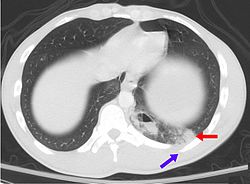without symptoms.

In medicine, a disease is considered asymptomatic if a patient is a carrier for a disease or infection but experiences no symptoms. A condition might be asymptomatic if it fails to show the noticeable symptoms with which it is usually associated. Asymptomatic infections are also called subclinical infections. Other diseases (such as mental illnesses) might be considered subclinical if they present some but not all of the symptoms required for a clinical diagnosis. The term clinically silent is also used.
Knowing that a condition is asymptomatic is important because:
- It may develop symptoms later and so require watch and wait or early treatment.
- It may resolve itself or become benign.
- It is required that a person undergoes treatment so it does not cause later medical problems such as high blood pressure and hyperlipidaemia.
- Be alert to possible problems: asymptomatic hypothyroidism makes a person vulnerable to Wernicke-Korsakoff syndrome or beri-beri following intravenous glucose.
- The affected person may be infectious and unknowingly spread the infection to others.
An example of an asymptomatic disease is Cytomegalovirus (CMV) which is a member of the herpes virus. "It is estimated that 1% of all newborns are infected with CMV, but the majority of infections are asymptomatic." (Knox, 1983; Kumar et al. 1984) In some diseases, the proportion of asymptomatic cases can be important. For example, in multiple sclerosis it is estimated that around 25% of the cases are asymptomatic, being these cases detected postmortem or just by coincidence (as incidental findings) while treating other diseases.
